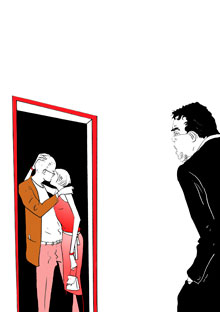"Can't We Be Friends?"

Illustration: Istvan Banyai
A young man I know, still in love with his girlfriend, tried to go along with her plea to remain friends after she told him that she wanted the freedom to see other men. A couple of months later, she invited him to her birthday party. In the course of the evening, while searching for a bathroom, he saw her through an open bedroom door passionately kissing another man. Feeling deeply hurt and angry, he later confronted her, whereupon she retorted, "But we said we'd be friends."
The girlfriend's response seems lacking in empathy and concern—traits we usually associate with friendship—but one wonders whether the young man wasn't setting himself up for a fall in the first place.
Can't we be friends? It's an old refrain, ready-made for the one who wants out of a relationship to deliver to the one who doesn't. Frank Sinatra gave it a permanent place in popular culture with the song "Can't We Be Friends?" (This is how the story ends / She's gonna turn me down and say / Can't we be just friends?) Sinatra, who never backed away from melancholy (at least in his music), understood a thing or two about mourning.
And mourning is the theme that matters here. Trying to be friends immediately following a breakup tends to prevent the rejected partner (and maybe both partners) from mourning the death of romantic love—from accepting its finality by suffering it all the way through. As painful as this can be, it ultimately performs an essential function. Behind the tears, mourning has silent work to do: It binds up the torn places where love was and gives them a chance to heal.
This is crucial, because falling in love carries us beyond our customary limits of self-expression into territory that puts our sense of self at risk. Two people in love place much of themselves in each other's hands for safekeeping; that kind of interdependence is why the loss of an intimate partner entails the depressing experience of being left behind with a diminished sense of your own existence.
Grieving the end of a relationship is a gradual process of extracting the "I" from a vanishing "we." It provides a way—the only way—to retrieve what you invested in a lover or spouse who has departed. Mourning is like casting a line into dark waters and trying to reel in those parts of yourself that you surrendered to the relationship, before they, too, disappear. Although friendship just after the split may offer temporary relief, it blocks the slow but necessary passage from loss to restoration of independence.
A number of years ago, I saw a patient who felt that her sex life was essentially over because she had suddenly been left by the man with whom she had experienced her first grand erotic passion. She did everything she could to win him back—calling, sending gifts, even promising to change anything about herself that wasn't satisfying to him—all to no avail. It took extensive work (and many tears) before she was able to see that the unparalleled sexiness she attributed to him was in fact the power of her own sexual desire. At this point, his image began to lose its magnetism for her.
What her experience suggests is that if you give in to mourning, unsettling though it may be, it will eventually finish its work. Only then do you again become free to fully inhabit your present life and turn from a sorrowing fixation on the past to the exciting unknown of the future.



